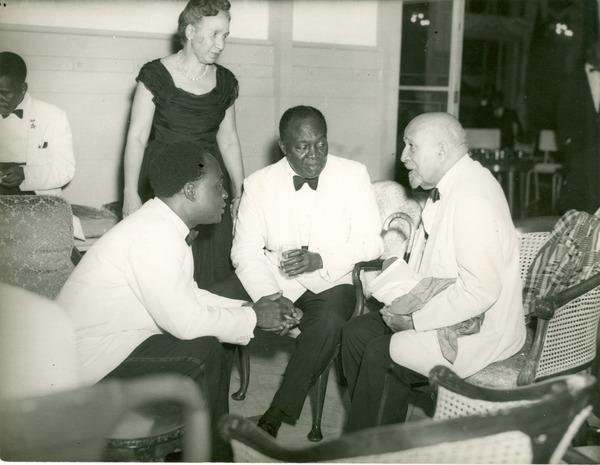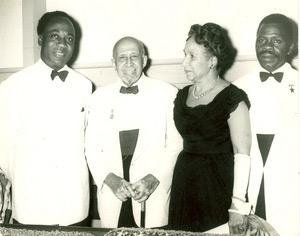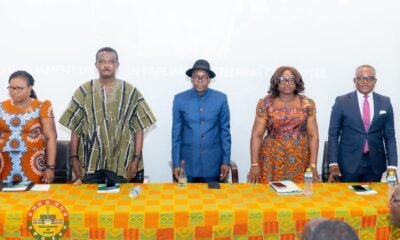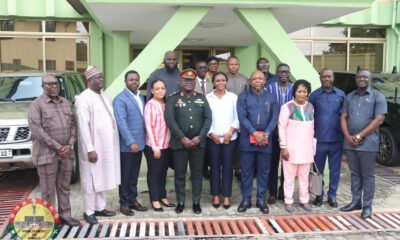News
Remembering Shirley Graham Du Bois: A Woman Who Called Ghana Home

Forty-eight years ago, Shirley Graham Du Bois passed away, leaving a global legacy. Though born in the U.S., she made Ghana her home, becoming a key figure in the country’s cultural, political, and media spaces. Not just the wife of Dr. W.E.B. Du Bois, Shirley was an accomplished writer, composer, historian, and civil rights activist in her own right.
In 1961, Ghana’s first President, Osagyefo Dr. Kwame Nkrumah, welcomed the Du Boises to Ghana. At age 93, Dr. Du Bois focused on completing the Encyclopedia Africana, a dream he shared with Nkrumah—to tell African history from an African perspective. Shirley supported the project and immersed herself in Ghana’s intellectual and political life.


After her husband’s death in 1963, Shirley stayed in Ghana, continuing their Pan-African work and strengthening ties between Ghana and the African American community. In 1964, she was appointed Director of Ghana National Television, where she shaped media content to reflect African culture and independence. She helped position Ghana as a leader in Pan-African media, empowered women in journalism, and created space for Black voices in global conversations.
Shirley believed Ghana could serve as a cultural and spiritual home for people of African descent across the globe. Through her media work and connections with the diaspora, she encouraged African Americans to look to Ghana not just as a destination, but as a place of belonging and pride.
She worked with Ghanaian intellectuals and leaders to promote policies that centered African identity and cultural strength. Her leadership style was inclusive and bold, challenging gender norms and advocating for more women to lead in media and politics. At a time when female voices were often silenced, Shirley Graham Du Bois stood tall.


Her efforts in radio, television, and print expanded Ghana’s influence during a key moment in the global Black liberation movement. She ensured that stories of African achievement, resistance, and unity were not just preserved, but shared boldly with the world.
But in 1966, the political shift following the overthrow of Nkrumah forced many, including Shirley, to leave Ghana. Even in exile, she remained a fierce advocate for African unity and cultural preservation, continuing to write, lecture, and speak on global platforms.
Today, as Ghana grows as a center for African American heritage tourism, Shirley’s contributions deserve recognition alongside figures like W.E.B. Du Bois and George Padmore. She helped establish Ghana as a beacon of Black excellence and Pan-African thought.
Her books—like Tom-Tom, Dr. George Washington Carver, Scientist, Paul Robeson, Citizen of the World, and There Once Was a Slave—still inspire readers today. On this anniversary, we remember her not just as a wife, but as a remarkable woman who helped shape Ghana’s place in global history.
The W.E.B. Du Bois Museum Foundation is proud to spearhead this commemoration as part of their mission to preserve and elevate Pan-African heritage. They are working to transform the W.E.B. Du Bois Memorial Centre for Pan African Culture into a world-class museum complex—a vibrant hub for education, tourism, and cultural diplomacy that honors the legacy of both Dr. Du Bois and Shirley Graham Du Bois.
By the W.E.B. Du Bois M
Hot!
Speaker of Parliament inaugurates open Parliament Steering Committee, launches action plan

The Speaker of Parliament, Alban Sumana Kingsford Bagbin, has launched the Open Parliament Steering Committee and the Open Parliament Action Plan.
The ceremony was under the theme “Achieving Gender Equality: Action by Action.”
The Speaker highlighted the critical role Parliament plays in translating the will of the people into inclusive legislation, responsive policies, and accountable governance.
“The International Day of Parliamentarianism is worth celebrating, as it offers an opportunity not only to recognise and promote achievements in strengthening democratic governance, but also to pause and reflect on the remaining gaps in institutionalising parliamentary democracy,” he said.
He noted that the event was scheduled to coincide with the International Day of Parliamentarianism to reinforce the importance of open and inclusive governance.
The Majority Leader, Mahama Ayariga, stated that the International Day of Parliamentarianism is intended to recognise the vital role Parliaments play globally as pillars of democratic governance.
He noted that this marks the first time Ghana is formally observing the day.
“The gravity of our observance is further accentuated as we convene to witness the launch of the Open Parliament Action Plan by the Open Government Partnership Caucus,” he said.
Delivering a statement on behalf of the Minority Leader, Alexander Kwamena Afenyo-Markin, the Deputy Minority Leader, Patricia Appiagyei, described the Open Parliament Action Plan as a transformative initiative aimed at strengthening the relationship between Parliament and the public.
She said the plan represents a bold commitment to making Parliament more transparent, accessible, and responsive to the needs of Ghanaians.
The Clerk to Parliament, Mr. Ebenezer Ahumah Djietror, described the launch as a key milestone in the effort to build a citizen-focused and accountable Parliament.
He added that the International Day of Parliamentarianism is a call to action to recommit to the highest standards of public service and democratic accountability.
The inauguration was attended by a wide range of stakeholders, including the Majority and Minority Members of Parliament, members of the Open Parliament Steering Committee, the Open Government Partnership (OGP) Caucus, Parliamentary Network Africa, representatives from civil society organisations, members of the diplomatic corps, traditional and religious leaders, student bodies, the Parliamentary Press Corps, and other media partners.
Hot!
NACOC declares drug menace a national emergency

The Parliamentary Committee on Defence and Interior has paid a working visit to the Narcotics Control Commission (NACOC) to engage with its leadership and assess operational challenges hampering the fight against illicit drugs.
In a detailed presentation, Dr. Basha Ligbi, Head of the Commission’s Research Bureau, highlighted critical setbacks including broken body scanners at airport terminals, inadequate office infrastructure, overcrowded detention facilities, and deteriorating vehicles.
He also called for the Commission’s headquarters to be reclassified as a security zone, citing growing security risks due to private encroachment and nearby high-rise developments.
Director General of NACOC, Brigadier General Maxwell Obiba Mantey, described the escalating drug trade as a national emergency, warning that drug barons now rival armed robbers in threat level and are gaining influence at the highest levels.
He appealed for stronger institutional support and morale-boosting interventions to preserve the integrity of NACOC officers.
Chairman of the Committee and MP for Builsa North, James Agalga, assured the Commission of the Committee’s commitment to escalate the concerns to Parliament and engage key justice sector stakeholders to fast-track reforms in support of NACOC’s mandate.














